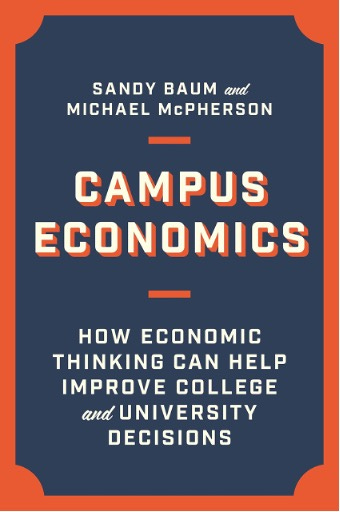We all know college is expensive. The rate of college tuition increases in the last 20 years, but particularly since the 2008 recession, is almost unbelievable. I was one of the lucky folks that started college in 2009 and had record increases in tuition each year during this period. Then I continued on for five years of graduate school just to make sure I wasn’t missing out on spending even more money on my education.
But why is college so expensive? Why are colleges constantly in financial crisis despite students paying $30,000 a year or more? Turns out the story is a heady mix of economics and legislation. In Campus Economics: How Economic Thinking Can Help Improve College and University Decisions, Sandy Baum and Michael McPherson provide an introduction to what the hell is going on behind the scenes of college finances.
Most people are highly ignorant of how college finances work because why would they bother to spend time learning about it? I only care really because I work in higher education and a deeper and more comprehensive understanding of the institution of higher education can help me make better decisions and take more effective action when trying to improve the enterprise.
College finances have a few key variables that substantially impact the inner mechanics. Whether a university is public or private, as who ‘owns’ the revenue differs, and whether a university is highly selective versus more open access to applicants. Most people’s exemplar of a university is a highly selective ivy university, like Harvard, or a flagship public university, like University of Michigan. While one is private (Harvard) and one is public (Michigan), they are both highly selective and neither are representative of the ‘average’ college’.
Campus Economics feels like an intro course to the foundations of college economics (I would love a graduate level course!). Baum and McPherson explain the distribution of different college types that make up our nation’s nearly 4,000 public and private colleges and universities (which I was surprised to learn that only 41% are public!). They also go into detail about the sources of revenue for colleges (which differs greatly between public and private). Four-year public universities receive only 17% of their revenue from state funding on average, which is shockingly low when compared to other countries in Europe for example. Surprisingly, all that tuition and fees students pay only cover on average 21% of costs at a four-year university.
The book also covers the complex, and sometimes unintuitive, way that financial aid works, how it gets incorporated into the college’s “bottom line” and how economic concepts like “opportunity cost” all plays into complex admissions decisions. Almost no one pays the full sticker price at universities, especially the non-wealthy that attend costly places like Harvard. But how that difference of thousands to tens of thousands of dollars gets accounted for in budgets is like putting together a giant puzzle.
Campus Economics is a great overview of the basics of how our universities are financed and a must read for anyone in the higher ed space. Decisions that seem obvious are usually ones that don’t take into account the big picture of moving parts and details of the college institution. Without a good understanding of the basics, real change can’t effectively occur.
Published: February 2023
Publisher: Princeton University Press
Format: Hardcover
If you think this sounds interesting, bookmark these other great reads:
Breaking Ranks: How the Rankings Industry Rules Higher Education and What to Do About It by Colin Diver (2022)
A Perfect Mess: The Unlikely Ascendancy of American Higher Education by David Labaree (2017)
You may also like…
This post contains affiliate links, allowing me to earn a small commission when you purchase books from the link provided. There is no cost to you, and this will allow me to keep this newsletter free and open to all. Happy reading!







